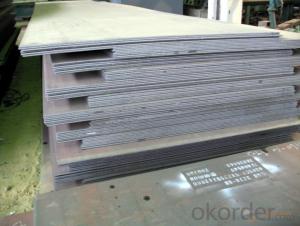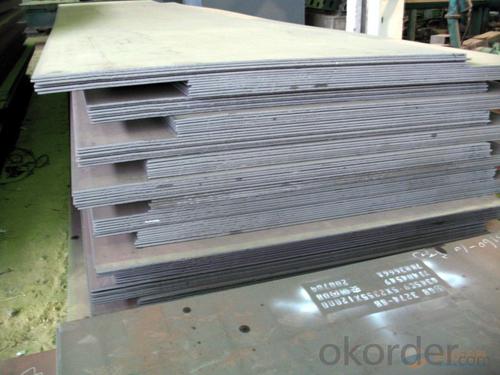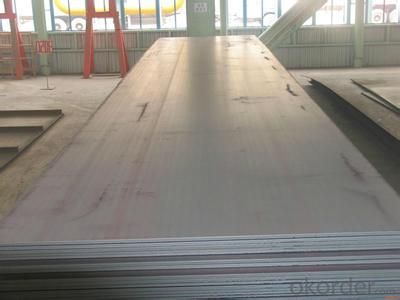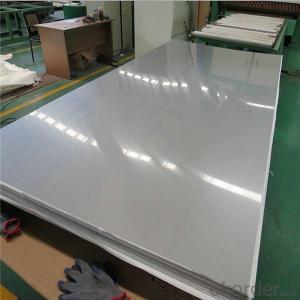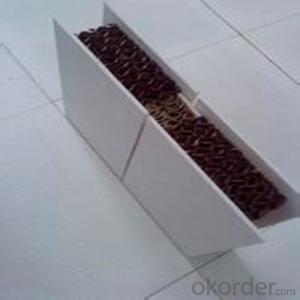Hull Structural Steel plate
- Loading Port:
- China Main Port
- Payment Terms:
- TT OR LC
- Min Order Qty:
- -
- Supply Capability:
- -
OKorder Service Pledge
OKorder Financial Service
You Might Also Like
Introduction
Shipbuilding steel generally refers to the steel for hull structure, it refers toaccording to the classification to build production specifications for the manufacture of hull structure steel. Often as a special steel orders, scheduling,sales, a ship comprises a ship plate, steel etc..
2 specification
Currently has several large iron and steel enterprises in China the production,but also can according to user needs production of different national standardof ship steel, such as the United States, Norway, Japan, Germany, France,etc..
Varieties and specifications
In hull structural steel according to the minimum yield point strength: Division ofgeneral strength of structural steel and high strength structure steel.
The general strength of structural steel China Classification Society standardsare divided into: A, B, D, E four grades; high strength structural steel China Classification Society standards into three grades, four grades.
Acceptance notice of delivery of ship steel
Edit
1, certificate of quality review:
Mill delivery must according to the requirements of users according to the standard stipulated in the contract delivery and provide the original certificate of quality. The certificate, must have the following contents:
(1) specification requirements; (2) quality record number and certificatenumber; (3) technical grade batch number,; (4) the chemical composition and mechanical properties; (5) the approval of the classification society certificate and surveyor signature.
2, physical examination:
Ship steel delivery, physical objects should have the production factory mark.There are specific:
(1) classification society recognized signs; (2) using the paint box or marking,including technical parameters such as furnace batch number, standardgrade, the length and width dimensions; (3) the appearance of smoothsmooth, defect free.
- Q: Can steel sheets be used for solar panel mounting systems?
- Yes, steel sheets can be used for solar panel mounting systems. Steel is a durable and strong material, making it suitable for providing structural support and stability to the solar panels. Additionally, steel sheets can be easily customized and shaped to fit the specific requirements of the solar panel installation.
- Q: Can the steel sheets be easily joined with adhesive?
- Yes, steel sheets can be easily joined with adhesive, provided that the adhesive used is specifically designed for bonding metals and has proper surface preparation and application techniques.
- Q: What is the difference between a galvanized and aluminized steel sheet?
- Galvanized steel and aluminized steel sheets are both widely used in various industries due to their durability and corrosion-resistant properties. However, there are distinct differences between the two. Galvanized steel sheets are coated with a layer of zinc to protect the underlying steel from rust and corrosion. This process, known as galvanization, involves immersing the steel sheet in a bath of molten zinc or applying a zinc-rich coating through electroplating. The zinc layer acts as a sacrificial barrier, meaning that it will corrode before the steel does, providing excellent protection against rust. Galvanized steel is commonly used in outdoor applications, such as roofing, fences, and automobile parts. On the other hand, aluminized steel sheets are coated with a layer of aluminum-silicon alloy. This process, known as aluminization, involves hot-dipping the steel sheet in a bath of molten aluminum or applying a thin layer of aluminum-silicon alloy through a continuous hot-dip process. The aluminum-silicon coating offers excellent heat resistance and corrosion resistance. Aluminized steel is commonly used in applications where high temperatures are present, such as automotive exhaust systems, heat exchangers, and ovens. In summary, the main difference between galvanized and aluminized steel sheets lies in the type of coating applied to the steel. Galvanized steel is coated with zinc, providing excellent rust protection, while aluminized steel is coated with an aluminum-silicon alloy, providing superior heat and corrosion resistance. The choice between the two depends on the specific requirements of the application, such as the presence of high temperatures or the need for long-lasting rust protection.
- Q: What factors affect the cost of steel sheets?
- Several factors affect the cost of steel sheets, including the current market demand and supply, raw material prices, manufacturing and processing costs, transportation and logistics expenses, as well as any applicable trade tariffs or taxes. Additionally, factors such as the type and quality of steel, size and thickness of the sheets, as well as any special finishes or coatings required, can also impact the overall cost.
- Q: What is the difference between a standard and high-strength steel sheet?
- The main difference between a standard and high-strength steel sheet lies in their mechanical properties. High-strength steel sheets have a higher yield strength and tensile strength compared to standard steel sheets. This means that high-strength steel sheets can withstand greater forces and pressure before deformation or failure occurs. They are commonly used in applications where durability and load-bearing capacity are critical, such as in automotive and construction industries. Standard steel sheets, on the other hand, have lower strength properties but are often more cost-effective and suitable for less demanding applications.
- Q: What are the uses of steel sheets?
- Steel sheets have a wide range of uses across various industries, including construction, automotive, manufacturing, and appliances. They are commonly used for roofing, siding, and structural purposes in buildings. Steel sheets are also used in the production of automobiles, ships, and aircraft due to their strength and durability. Additionally, they are utilized as raw materials for manufacturing machinery, appliances, and electrical equipment.
- Q: What's the material of ASTM A653 G30 galvanized sheet?
- ASTM A653 G30 galvanized sheet material:ASTMA653 is American Standard, equivalent to the domestic Q195 or SGCC. Hot-dip galvanized steel sheet with a coating thickness of 0.3 ounces per square inch. Material has universal specifications.
- Q: What is the difference between a HRPO and HRSPO steel sheet?
- HRPO and HRSPO are both types of steel sheets, but they differ in their manufacturing process and resulting properties. HRPO stands for Hot Rolled Pickled and Oiled, while HRSPO stands for Hot Rolled Skin Passed and Oiled. The HRPO steel sheet is made by subjecting a hot rolled steel coil to a pickling process, which involves removing impurities and scale from the surface using an acid bath. After pickling, the steel sheet is then oiled to prevent corrosion during storage and transportation. This process results in a smooth and clean surface finish. On the other hand, the HRSPO steel sheet undergoes an additional skin pass process after pickling and oiling. During the skin pass process, the steel sheet is passed through a set of rolls to improve the surface finish and reduce its thickness. This process also imparts a certain level of cold work to the steel, enhancing its mechanical properties. In terms of properties, HRPO steel sheets exhibit good formability, weldability, and paintability due to their clean surface and lack of scale. They are commonly used in applications that require a smooth surface finish, such as appliances, automotive parts, and exposed architectural components. HRSPO steel sheets, with their improved surface finish and reduced thickness, offer even better formability and surface quality compared to HRPO sheets. They are often used in more demanding applications where precise dimensional control and surface aesthetics are crucial, such as automotive body panels, electrical enclosures, and furniture manufacturing. In summary, the main difference between HRPO and HRSPO steel sheets lies in the additional skin pass process that HRSPO undergoes, resulting in improved surface finish, reduced thickness, and enhanced mechanical properties. The choice between the two depends on the specific requirements of the application in terms of surface quality, dimensional control, and mechanical performance.
- Q: Can steel sheets be used for containers or storage units?
- Yes, steel sheets can definitely be used for containers or storage units. Steel is a highly durable and strong material that is commonly used in the construction of containers and storage units due to its ability to withstand heavy loads and extreme weather conditions. Steel containers and storage units provide a secure and reliable solution for storing various items such as household goods, tools, equipment, and even larger items like vehicles. Steel sheets used for containers and storage units are often reinforced with additional features such as locking mechanisms, insulation, and ventilation to enhance their functionality. Additionally, steel containers and storage units are also portable and can be easily transported to different locations if needed. Overall, steel sheets are an excellent choice for containers and storage units due to their strength, durability, and versatility.
- Q: Is the pattern steel plate hot-dip galvanized steel?
- A steel plate with a raised (or dented) surface on a surface (patterned, section). Pattern steel plate, also known as checkered steel plate, is its surface with diamond or protruding steel plate. The pattern can be a single diamond, a lentil shape or a round bean shape, or two or more than two patterns can be properly combined to form a composite pattern board. Pattern mainly from anti-skid and decorative effect. The comprehensive effects of antiskid, bending resistance, metal saving and appearance of the combined pattern board are obviously better than that of the single pattern board. Checkered steel plates are widely used in shipbuilding, boilers, automobiles, tractors, railway cars and construction industries.
Send your message to us
Hull Structural Steel plate
- Loading Port:
- China Main Port
- Payment Terms:
- TT OR LC
- Min Order Qty:
- -
- Supply Capability:
- -
OKorder Service Pledge
OKorder Financial Service
Similar products
Hot products
Hot Searches
Related keywords
